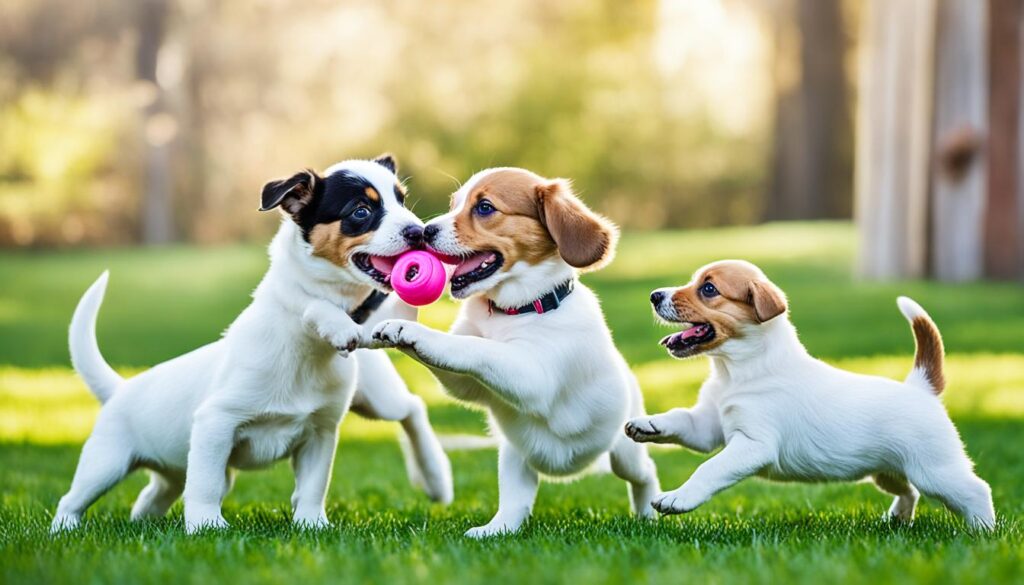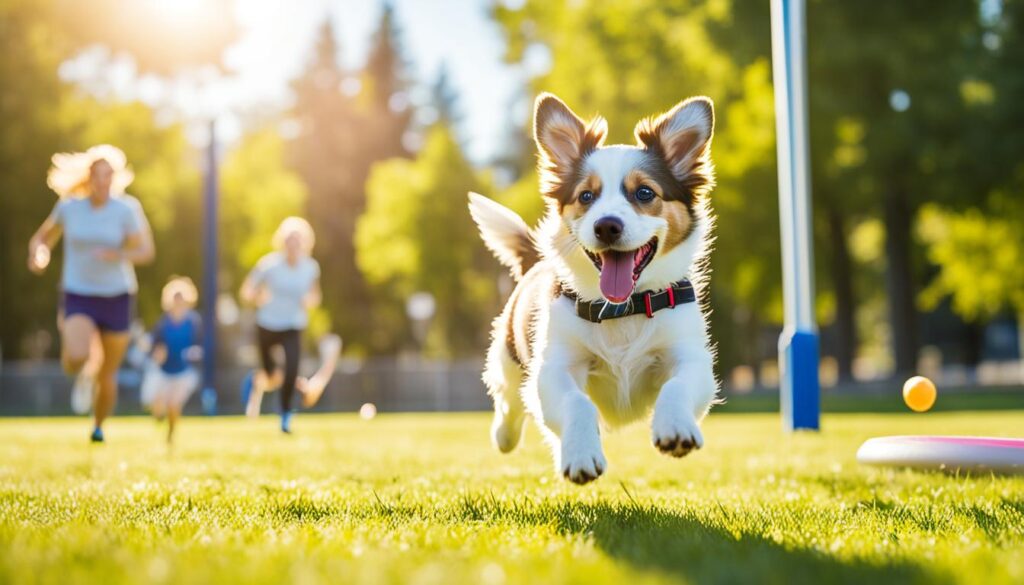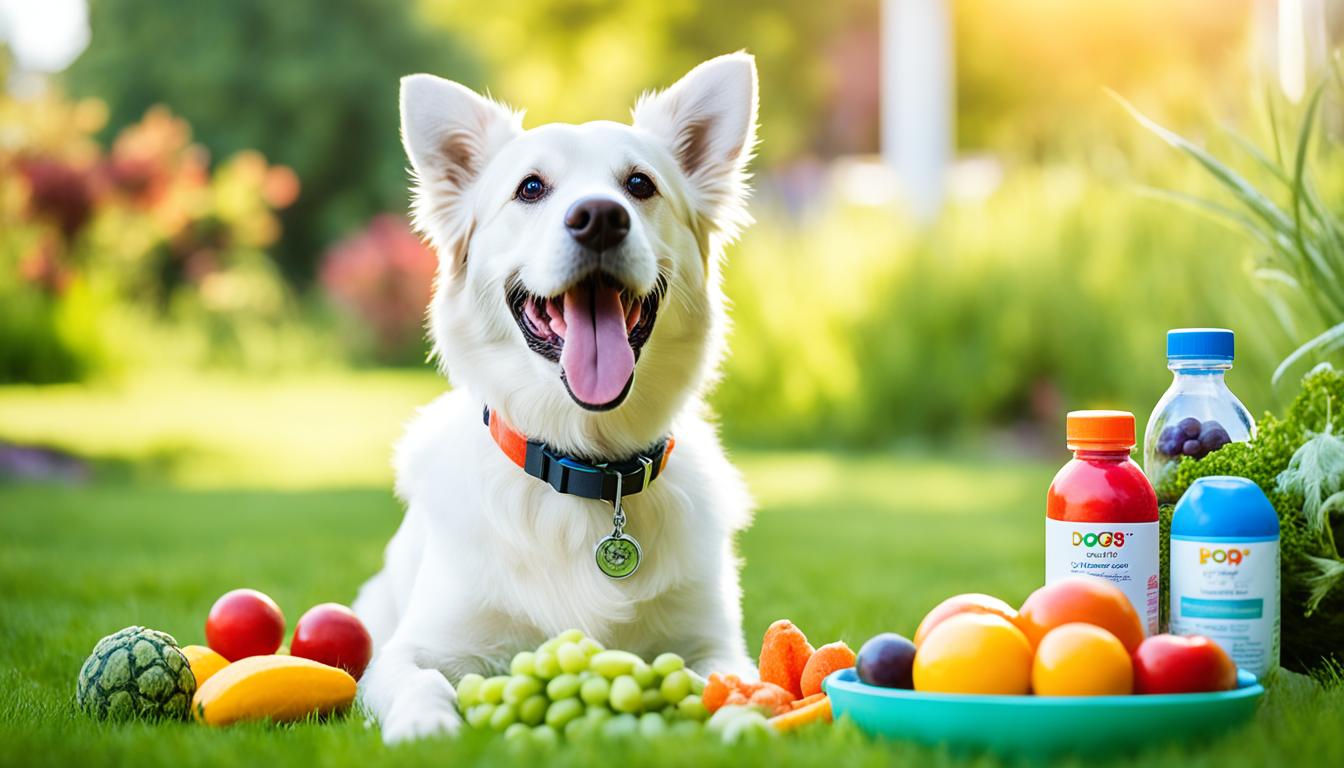As an Amazon Associate I earn from qualifying purchases.
Bringing home a puppy is an exciting and joyful experience, but it also comes with the responsibility of ensuring their health and wellbeing. As a pet parent, you want to provide the best care possible, but where do you start? How can you ensure that your furry friend stays happy and healthy throughout their life?
In this article, we will share essential dog health tips that will guide you in raising a happy and healthy pup. These tips are based on expert advice and research sources and cover important aspects such as connecting with a vet, feeding your puppy the right diet, being prepared with necessary supplies, and much more. Are you ready to transform into a knowledgeable and confident pet parent? Let’s dive in!
Key Takeaways:
- Connect with a trusted veterinarian to ensure your puppy’s health and wellbeing.
- Choose a high-quality puppy food that meets their specific nutritional needs.
- Be prepared with essential supplies to create a safe and comfortable environment.
- Establish a routine for potty training and consistently reinforce desired behavior.
- Start training your puppy early to establish a strong bond and prevent behavioral issues.
Connect with a Vet
Your puppy’s health and wellbeing are of utmost importance, and a veterinarian plays a vital role in ensuring their care. It’s crucial to connect with a vet early on and establish a trusting relationship to provide the best possible puppy vet care. Here are some essential tips for choosing a veterinarian:
- Seek Recommendations: Reach out to family, friends, and fellow pet owners for recommendations on reliable and trustworthy vets in your area. Personal experiences and word-of-mouth can provide valuable insights.
- Inquire about Philosophy, Fees, and Policies: Ask the vet about their approach to puppy care and treatment. Inquire about their fees, payment options, and policies regarding emergencies, appointments, and follow-up care.
- Visit the Clinic: Schedule a visit to the clinic in person to assess the environment and interact with the staff. Look for cleanliness, professionalism, and a friendly atmosphere. A well-maintained clinic with caring staff is indicative of quality care.
- Consider Location and Emergency Care: Choose a vet located in proximity to your home for ease of access during regular check-ups and emergencies. Additionally, inquire about their availability for after-hours or emergency care.
Evaluating these factors will help you in choosing the right veterinarian for your beloved puppy. Remember, a strong and trusting relationship with your vet is essential for providing the best puppy vet care throughout their life.
Expert Tip:
“When choosing a veterinarian, it’s important to consider their experience and expertise in puppy care. A vet who specializes in canine health and has a genuine love for animals will be better equipped to understand and address your puppy’s unique needs.”
By connecting with a vet who aligns with your values and priorities, you can ensure that your puppy receives the care they deserve.
Next, let’s explore the importance of feeding your puppy a balanced diet and providing them with the right nutrition.
Feed Them Right
When it comes to raising a healthy and happy pup, proper nutrition is key. Your puppy’s growth and development depend on a high-quality diet that meets their specific nutritional needs. So, make sure you choose the right puppy food that will provide them with the essential nutrients they need to thrive.
Growing puppies have higher energy requirements than adult dogs, which means they need more calories, fat, and protein. Look for a high-quality dog food that is specifically formulated for puppies to ensure they get the right balance of nutrients. Pay attention to the ingredients and avoid foods that contain fillers or artificial additives.
Key Nutrients for Your Puppy’s Health
Here are some essential nutrients that your puppy needs for optimal health:
- Protein: Proteins are the building blocks of your puppy’s body. Look for a dog food that contains high-quality protein sources like chicken, beef, or fish.
- Fat: Healthy fats are important for your puppy’s brain development, energy, and coat health. Consider incorporating sources of omega-3 fatty acids, such as fish oil, into their diet.
- Carbohydrates: While puppies require more protein and fat, carbohydrates are still important for providing energy. Choose dog foods that include wholesome grains, vegetables, or fruits.
- Vitamins and Minerals: Ensure that your puppy’s food contains a good balance of essential vitamins and minerals for overall health and proper development.
Feeding Guidelines
Feeding your puppy the right amount of food is crucial to prevent underfeeding or overfeeding. Follow the feeding guidelines provided on the puppy food packaging, but remember that each puppy is unique, and their needs may vary.
As your puppy grows, you’ll need to adjust their portions accordingly. Monitor their body condition and consult your veterinarian for guidance on the appropriate amount of food to feed your growing pup.
Remember, well-fed puppies are happy puppies!
Be Prepared
Before bringing your puppy home, it’s important to be prepared with necessary supplies. Ensuring you have all the essential puppy supplies will help you create a comfortable and safe environment for your new furry friend. Here is a list of items that you should consider:
| Essential Puppy Supplies |
|---|
| Crate |
| Bedding |
| Bowls |
| Leash and harness or collar |
| Puppy-safe toys |
| Vet-approved shampoo and brushes |
| Poop bags |
| Baby gates |
| Enzyme spray for accidents |
| Dog toothpaste and toothbrush |
| ID tags |
| Dog food |
Crate training is an important aspect of preparing for a puppy’s arrival. It serves multiple purposes, such as aiding in potty training and providing your puppy with a safe and comfortable space. Make sure to choose a crate that is the right size for your puppy’s breed and age. Line the crate with bedding to make it cozy.
Take it (Poop) Outside
Potty training is an essential aspect of raising a puppy. It’s a messy, yet necessary, part of the process. But don’t worry, with some time, patience, and routine establishment, you’ll have your pup doing their business in the appropriate place in no time.
One effective method for potty training is using a crate. This helps teach your puppy to hold their bladder, as they naturally don’t want to soil their sleeping area. Make sure the crate is the right size for your pup, allowing them to comfortably stand up, turn around, and lie down.
To establish a routine for potty breaks, feeding, and rest time, it’s important to create a schedule. Consistency is key in potty training. Take your puppy outside to their designated potty spot at regular intervals throughout the day. This includes after meals, nap times, play sessions, and waking up in the morning or after a nap.
Pro Tip: Create a verbal cue for your puppy to associate with potty time, such as “Go potty!” or “Do your business!” This helps them understand your expectations and reinforces desired behavior.
“A routine is important not just for potty training, but also for overall routine development. It helps your puppy feel secure and establish healthy habits.”
When your puppy successfully goes potty outside, make sure to praise them and offer a small treat as a reward. Positive reinforcement helps reinforce the idea that going outside is the desired behavior. However, avoid punishing or scolding your puppy for accidents in the house. They are still learning, and accidents happen.
Pro Tip: Avoid using pads or newspapers inside the house as a temporary solution for potty training. This can confuse your puppy and make it harder for them to understand where they should do their business.
| Potty Training Do’s | Potty Training Don’ts |
|---|---|
|
|
Train Them Early and Often
Training your puppy is not just about obedience. It’s about building a strong bond and shaping their behavior from the beginning. Start training early and be consistent to set your puppy up for success. Here are some entertaining and effective puppy training tips to help you establish a lifelong connection and prevent common behavioral issues:
Puppy Bedtime Boundaries
Decide where your puppy will sleep and stick to it. Create a cozy den-like area with a comfortable bed, ensuring they have a safe and secure space for rest and relaxation. Consistency is key in establishing bedtime boundaries.
Avoid the Barking Blues
Excessive barking can be a noisy nuisance. Teach your puppy early on that barking excessively isn’t acceptable behavior. Use positive reinforcement and redirect their attention to a toy or treat when they start barking unnecessarily.
Remember, a well-trained dog is better equipped to handle different situations and environments. So, invest time and effort into their training to lay a strong foundation for their future obedience.
Boundaries for Certain Areas
Set boundaries for areas where you don’t want your puppy to go, such as the kitchen or living room. Use baby gates or teach them commands like “stay” or “out” to establish these boundaries effectively.
Promote Independence
Encourage your puppy to become independent by slowly introducing alone time. Start with short periods, gradually increasing the duration. This will help prevent separation anxiety and foster their ability to entertain themselves.
“Establishing a strong bond requires trust, consistency, and clear communication. Play, learn, and grow together for a lifelong connection that’s based on love and respect.”
Professional Training Assistance
If you’re unsure where to start or need guidance with your puppy’s training, consider enrolling in puppy training classes or hiring a professional dog trainer. They can provide expert advice, personalized training plans, and additional socialization opportunities for your furry friend.
Remember, training is an ongoing process, and consistency is key. Be patient, use positive reinforcement, and celebrate small victories along the way. With the right training approach, you’ll build a strong bond with your puppy and shape them into a well-behaved and happy dog.
Teach Bite Inhibition
Teaching your puppy bite inhibition is crucial for their safety and the safety of others. Puppies explore the world through their mouths and may bite, especially during teething. When your puppy bites too hard during play, stop the play and make a sound like a yelp. This helps them learn to control the strength of their bite. Encourage interactions with other puppies or dogs to further develop their bite inhibition skills.
Start Socialization Right Away
Socializing your puppy from an early age is essential for their development into a well-adjusted and confident dog. It’s important to introduce them to various environments, people, dogs, and stimuli in a positive way.
Allowing your puppy to experience new things and meet different types of dogs will help them feel more comfortable and confident in the world around them. Puppy classes, dog parks, and playdates can be great opportunities for socialization.
Remember to go at a pace that’s comfortable for your puppy and use positive reinforcement to encourage good behavior. Working closely with your vet will help ensure that you balance socialization activities with your puppy’s vaccination schedule.
Here are some tips for successful puppy socialization:
- Expose your puppy to a variety of environments, such as parks, shopping centers, and busy streets, gradually increasing the level of complexity.
- Introduce them to different types of people, including adults, children, and people wearing hats or carrying umbrellas.
- Arrange playdates with other well-socialized and friendly dogs, under appropriate supervision.
- Expose them to different sounds, such as traffic noises, household appliances, and fireworks, in a controlled and positive way.

Remember, the goal of socialization is to help your puppy feel comfortable and confident in a variety of situations. By starting socialization early and providing positive experiences, you are giving your puppy the best chance at becoming a well-rounded and happy adult dog.
Prevent Separation Anxiety
Most dogs dislike being left alone for extended periods, and some may experience puppy separation anxiety. It’s essential to help your puppy adjust to alone time gradually to prevent this issue from developing. Here are some strategies to ease their transition:
- Start small: Begin by acclimating your puppy to alone time in their crate while you’re still home. Start with short periods, and gradually increase the duration over time.
- Positive associations: Provide your puppy with a frozen treat-filled toy before leaving. This will create a positive association with the crate and help them associate your departure with something enjoyable.
- Exercise before departures: Engage your puppy in physical exercise before leaving. Tiring them out will help reduce anxiety and provide a sense of calmness during their alone time.
- Establish a routine: Create a consistent daily routine for your puppy, including regular alone time. Having a structured schedule helps them anticipate and adjust to periods of separation.
By gradually increasing alone time and implementing positive associations, you can effectively help your puppy adjust to alone time and prevent separation anxiety in the long run. Remember, patience and consistency are key to creating a sense of security and independence for your furry friend.
Expert Tip:
“When helping puppies adjust to alone time, it’s essential to establish a routine and gradually increase alone time. This way, you’re setting them up for success and preventing separation anxiety from developing.”
– Dr. Sarah Johnson, Veterinarian
Make Exercise a Habit
Regular exercise is vital for your puppy’s physical and mental wellbeing. It helps them burn off energy, maintain a healthy weight, and promote overall happiness. Just like humans, puppies need physical activity to stay healthy and prevent behavioral issues.
There are various ways to incorporate exercise into your puppy’s routine. Take them for daily walks to explore the neighborhood and socialize with other dogs. Engage in active play sessions, such as fetch or hide and seek, to stimulate their minds and keep them physically active. Mental stimulation is equally important as physical exercise, as it helps prevent boredom and destructive behavior.
When exercising your puppy, always consider their age and physical abilities. Puppies have developing bones and joints, so it’s crucial to avoid overexertion. Start with shorter walks and gradually increase the duration as they grow. Make sure the exercise is appropriate for their breed and size.
“Exercise is not just about physical fitness; it’s also about mental stimulation and bonding with your puppy.”
Supervised playtime in a secure space is another great way to keep your puppy active. Use toys that encourage movement and interaction, such as puzzle toys or treat dispensers. This not only provides physical exercise but also stimulates their problem-solving skills.
Remember that exercise should be a fun and enjoyable activity for both you and your puppy. It’s a great opportunity to strengthen the bond between you and create positive experiences. So, get out there and make exercise a habit for a happy and healthy puppy!

Benefits of Regular Puppy Exercise:
- Helps maintain a healthy weight
- Boosts cardiovascular health and muscle tone
- Improves digestion and reduces constipation
- Provides mental stimulation and prevents boredom
- Reduces the risk of behavioral issues
- Promotes socialization with other dogs and people
- Strengthens the bond between you and your puppy
Get Your Pup Vaccinated
Vaccinations are like super shields for your furry friend. They play a crucial role in protecting your puppy from life-threatening diseases. By consulting with your veterinarian and following their recommended vaccination schedule, you are providing the best defense for your pup’s health and wellbeing.
Typically, puppies start receiving vaccinations around 6-8 weeks old and continue every few weeks until they reach 16 weeks old. These initial shots help build their immunity against diseases like parvovirus, distemper, and canine hepatitis.
But the journey doesn’t end there! Just like how superheroes need occasional booster shots to maintain their powers, your puppy needs them too. Booster shots ensure long-term protection against diseases, strengthening their immune system throughout their life.
Vaccinations are a lifesaver, preventing various diseases that can have devastating effects on your puppy’s health and potentially be passed on to other dogs. So, don’t skip those vet appointments—your furry sidekick will thank you!
| Vaccine | Age of Administration | Protection Against |
|---|---|---|
| Distemper | 6-8 weeks | Canine distemper virus |
| Parvovirus | 6-8 weeks | Parvovirus infection |
| Hepatitis | 6-8 weeks | Infectious canine hepatitis |
| Parainfluenza | 6-8 weeks | Canine parainfluenza virus |
| Bordetella | 10-12 weeks | Bordetella bronchiseptica (kennel cough) |
| Rabies | 12-16 weeks | Rabies virus |
Remember, prevention is the key to keeping your puppy healthy. So, suit up your pup in their superhero cape of vaccinations and let them embark on a safe and happy journey through life!
Conclusion
Congratulations on your new furry friend! By following these puppy health tips, you are well on your way to raising a happy and healthy pup. Remember, it’s important to connect with a vet who will be your partner in your puppy’s care. From choosing the right diet and being prepared with essential supplies to training, socialization, and vaccinations – every aspect of their care contributes to their overall wellbeing.
Be patient and consistent in your approach, prioritizing your puppy’s mental and physical health. With proper care and attention, your puppy will grow into a well-adjusted and thriving dog, bringing joy and companionship to your life for years to come.
So, embrace the journey of raising a puppy and enjoy this special time of bonding and growth. Your commitment to their health is the foundation for a lifelong bond and the key to raising a happy and healthy pup.
FAQ
How do I choose a veterinarian for my puppy?
What should I feed my puppy to ensure their optimal nutrition?
What essential supplies do I need to prepare for bringing my puppy home?
How can I potty train my puppy?
What is the importance of early training for my puppy?
How can I teach my puppy bite inhibition?
How can I socialize my puppy properly?
How can I prevent separation anxiety in my puppy?
How much exercise does my puppy need?
Why are vaccinations important for my puppy?
Source Links
- https://barkatl.com/tips-and-tricks-to-raising-a-healthy-happy-pup/
- https://www.kingsdale.com/7-key-tips-for-raising-a-happy-and-healthy-puppy
- https://www.thefarmersdog.com/digest/tips-happy-healthy-puppy/
As an Amazon Associate I earn from qualifying purchases.

